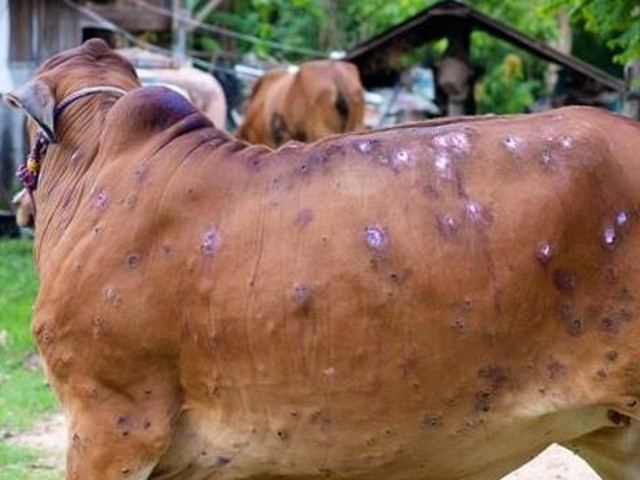
The lumpy skin disease has spread into the nook and cranny of Mianwali, affecting scores of cattle, buffaloes and rams.
Things have come to such a pass that people are avoiding eating meat. Corpses of animals that died due to the virus are thrown in streets instead of dumping them at the designated spaces. Cattle owners have lost millions of rupees while the meat business has been adversely affected due to fall in the demand for meat. On the other hand, mutton prices have gone out of the reach of the people.
The demand for broiler chicken has increased and so has its price: from Rs470 per kilogram to Rs520 a kilogram.
Milk production has also gone down. Mianwali’s neighboring districts, especially Bhakkar, have also been affected by the lumpy skin disease.
In this regard, a news item was carried by The Express Tribune in its edition of July 29, in which an attempt was made to draw the attention of the authorities to the prevalence of the disease and the urgency for medicines for the lumpy skin disease.
The spread of the disease would have been reduced to some extent if corrective measures had been taken on time.
The disease originated in Sindh and spread to Punjab.
A meeting was held on Saturday under the chairmanship of Mianwali Deputy Commissioner Umair Awan in which arrangements related to dealing with the lumpy skin disease were reviewed.
Additional Director Dr. Sheikh Muhammad Laeeq briefed the deputy commissioner on the measures being taken to treat animals suffering from the disease.
He also told the deputy commissioner about the awareness programmes being conducted across the district by the livestock authorities.
According to the Director of Livestock, Laeeq Sheikh, this was a viral disease that still needed research, but the available treatment was being provided immediately at all locations.
He said that there was no harm if meat was cooked well and milk boiled properly.
The deputy commissioner said that he would not tolerate any kind of negligence in controlling the lumpy skin disease.
He said that reports on the activities of the veterinarians vis-a-vis dealing with the disease should be sent to his office on a daily basis.
The assistant commissioners of the three tehsils of the district should immediately order the chief officers of the town committee and municipal committees of their respective cities to dig pits and bury the animals that died of the disease.
The livestock owners should immediately report to the Helpline of the District Control Room so that the CO of the committee could bury the dead animal.
The deputy commissioner ordered a crackdown on quacks and sellers of fake medicines.
The DC said that the health department and municipal committee staff would spray all the areas to prevent the disease from spreading further.
The deputy commissioner asked the authorities concerned to approach the director of Sargodha region for supply of more medicines so that people's cattle could be protected.
A farmer, Riaz Khokhar, said that ninety percent of the people living in the villages were small farmers who owned a small number of livestock.
“Two of my cows have died of the disease. I sell milk, but now making a living has become difficult,” he said.
Another dairy farmer, Shaukat Khan, said he had had a cow worth Rs250,000 which died of this disease. There was a calf of that cow which survived.
“So, I had had some hope, but after a few days the effects appeared on her too, and she too fell victim to the disease,” he said while his eyes welled up with tears.
A big dairy trader, Malik Iqbal, said that the disease had nearly ruined the businesses of dairy farmers. He said he used to sell hundreds of liters of milk every day, but now he could not manage to sell even 40 liters of milk a day.
Meanwhile, a successful crackdown was carried out in Mianwali city, Musa Khel, Van Bacharan, Gulmeri, Zilla and Sargodha on the medical stores and quacks who had been looting the cattlemen under the guise of treating the animals suffering from the lumpy skin disease.
Many veterinary medical stores were fined for allegedly possessing illegal medicines.
Drug Inspector Ali Akbar seized those medicines.
It was reported that the owners of other veterinary stores allegedly selling fake medicines had shut down their shops and gone into hiding out of fear of being caught.
Published in The Express Tribune, August 22nd, 2022.



1727778647-0/diddy-(16)1727778647-0-165x106.webp)

1732014631-0/BeFunky-collage-(71)1732014631-0-165x106.webp)
1732012115-0/Untitled-design-(14)1732012115-0-270x192.webp)
1732002687-0/Untitled-design-(11)1732002687-0-270x192.webp)

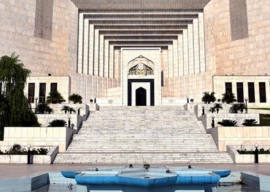
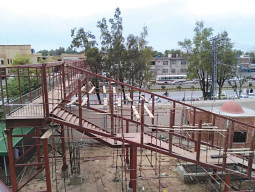

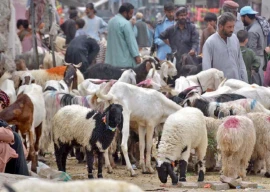
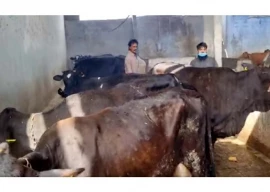
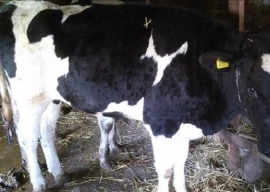






COMMENTS
Comments are moderated and generally will be posted if they are on-topic and not abusive.
For more information, please see our Comments FAQ